12 Aug 2024
How to Build a Custom POS System for Your Enterprise
Matthew Connor
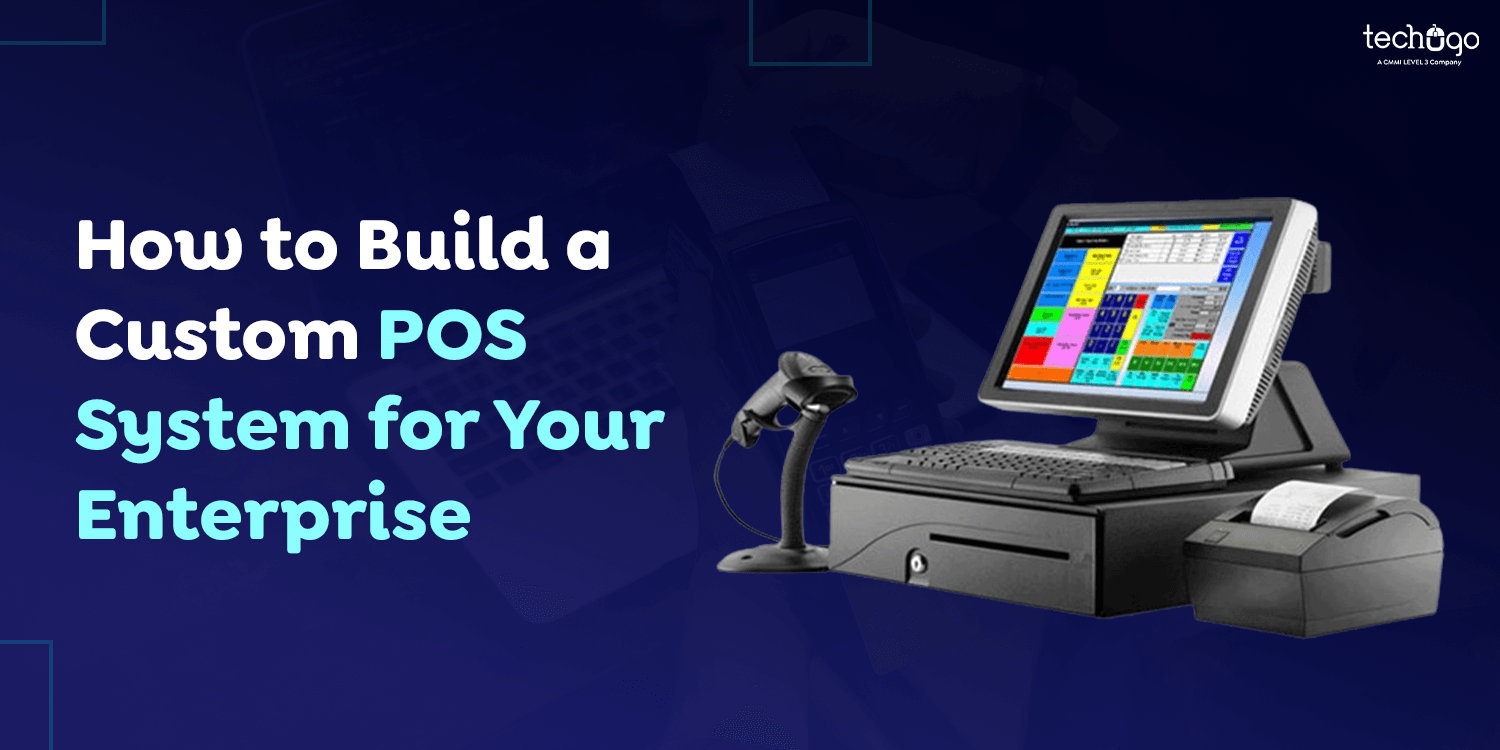
From the first cash register inside a Salon in 1879 until the omnichannel experience of Starbucks by 2024, customers’ experiences have experienced a dramatic transformation. Automated payments have been replaced with automated systems, and contactless payments enable transactions at a lower cost.
However, whether you run a multi-store hospitality chain or a cafe in your local area, long lines can be a problem and create chaos for customers. The customer experience strategy you implement requires a custom POS system to reduce customers’ shopping time and enhance their customer experiences.
According to Statista, the POS technology market is set to earn USD 42.5 billion in 2027, nearly three times more than in 2018. In this article, we’ll discuss how business users can set it up as an actual device or point of sale in any place to process transactions, record information, and track cash flow.
What is a Custom POS System?
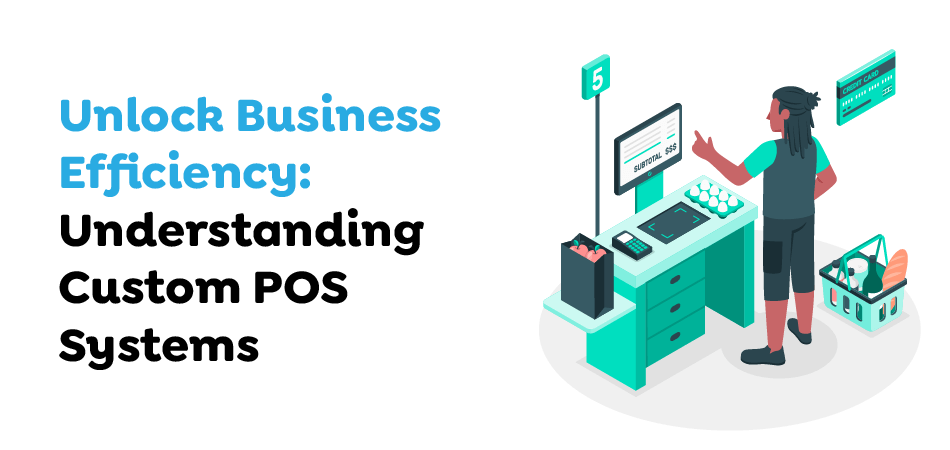
A custom POS system utilizes software to handle the transactions of customers, control inventory, and simplify daily business operations that are tailored to the needs of:
Service-providing companies, public transportation retail stores, health organizations, as well as multi-service organizations (theaters, malls, theaters)
Trading and real estate markets (builders inspectors, builders)
Restaurants, cafes, bakeries, bars, breweries, and restaurants
It allows your company to operate from anywhere worldwide and keep the fintech services and supply chain in check. These are the kinds of POS systems that you could develop:
Mobile/Tablet/Terminal-based Custom POS:
This type of POS requires hardware to work with debit and credit cards, like self-service kiosks with smartphones or tablets for on-the-go and contactless payments.
Cloud-based Custom Point of Sale:
This is designed for businesses operating from various geographic places around the globe with remote access to online data backups and storage space.
On-premise Customized POS:
These operate locally on servers and can be customized entirely and accessible via personal computers.
Significance of Custom PoS in Business

In the ever-changing business world, more than a universal method is required for companies to grow. Custom PoS systems play an essential function in adjusting technology to meet an enterprise’s specific requirements, creating an entanglement between operations and technology. The significance of a Custom PoS can be elucidated through a number of important aspects.
Performance: A custom PoS system can streamline processes, removing obstructions and decreasing the amount of time spent on routine tasks. This improves operations efficiency and can free up valuable resources that can be put toward strategic initiatives.
Flexibility to Business Models: Every company operates according to its business model, whether in hospitality, retail, or the e-commerce industry. A custom PoS system can be designed to specifically cater to these types of businesses, ensuring that the technology is in sync with the company’s specific workflow and needs.
Competitive Advantage: It is important to differentiate yourself in a highly competitive market. Custom PoS systems allow companies to stand out by giving customers a personalized experience, including customized promotions and specific customer information, providing them a distinct competitive advantage. All this can be developed with the help of an app development company in Canada.
Scalability: As companies grow and their requirements increase, so do their requirements. The custom PoS systems are designed with scalability in mind, permitting seamless expansion without the restrictions commonly encountered when using off-the-shelf solutions.
Ultimately, a Custom POS is not just an operational tool but transforms into a strategic enabler that constantly evolves and adjusts with the company to help drive growth in a rapidly changing market. The following sections will discuss the many advantages and attributes that make Custom PoS systems indispensable for modern companies.
Also Read : Transform Your Business With Supply Chain Management (SCM) Software: A Growth Strategy in 2024
Choosing the Right POS Software
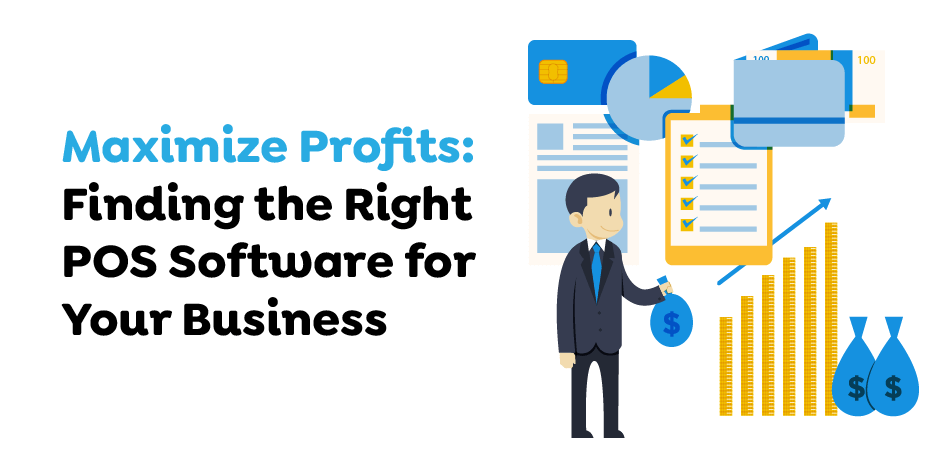
Following the guidelines for installing a custom POS system, it’s important to take your time and choose the appropriate POS software that is compatible with your company’s needs to streamline operations and increase overall efficiency.
Restaurant POS
A restaurant POS system incorporates various features that can help improve the efficiency of restaurant financial transactions and ensure the smooth processing of payments.
Salon POS
The salon’s custom POS system is specific software used by salon staff to control their business processes effectively.
This software makes it easier to manage various tasks, including inventory, appointment, customer tracking, and safe payment processing, eventually increasing the salon’s overall efficiency.
Pharmacy POS
The importance of a custom POS system in pharmacies is not overstated, principally because they facilitate rapid and precise sales transactions, making it easier for pharmacists to take care of prescriptions and manage purchases effortlessly.
Through seamless integration with the pharmacy’s inventory management system, it will provide regular updates on stock levels and timely alerts to replenish medication stock, which results in streamlined processes, a reduction in errors, and rapid delivery of medication to customers.
Supermarket POS
Systems for POS at supermarkets can be vital equipment for business owners. They allow cash-in-person transactions, print receipts, track inventory, and manage employees.
In addition, these systems usually include additional functions, like reward programs for loyal customers, EBT/WIC support sales, online ordering options, and even regulated sales of items.
It can also handle custom-made food sales, which help ensure the supermarket’s efficient and seamless operation.
Bookstore POS
The store POS software is flexible software developed to handle electronic payments for books in-store and online. It simultaneously manages the inventory of books and preserves special collections of books and boxes available for sale, offers discounts and gift cards, and establishes an incentive program for customers.
Furthermore, a well-fitting bookstore POS system allows additional features, such as a rental program, selling tickets for events, letting customers book backorders or request books, offering store credit, and incorporating additional features to improve the store’s operations and enhance customers’ experience.
Also Read : The Ultimate Guide to Legal Case Management Software: Streamline Your Success
Pros of a Custom Point of Sale
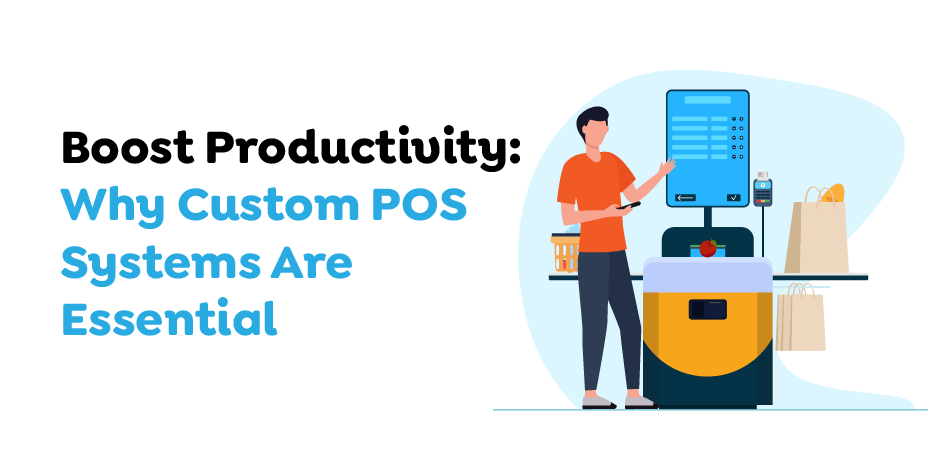
It’s no surprise that having your own custom POS software tailored to your business needs has plenty of benefits! Here are 4:
Adaptability
The primary benefit of a customized POS is its ability to adapt. In reality, personalized features are designed to meet the business’s particular needs and are tailored to the owners’ preferences. Additionally, they make the use of the POS system easier for staff members and increase efficiency.
Achieving the company’s needs improves the overall efficiency of operations. By removing unnecessary features in other POS systems, processes are simplified, and transactions are speeded up, improving the business’s overall performance.
Custom Integrations
Although a custom POS system is vital to the smooth running of any business, it’s often not the only option used by the business. One benefit of modifying the POS system is the ability to integrate it with other applications employed internally. This could be with accounting systems, inventory management software, online sales platforms, or loyalty programs: the decision is yours, and the possibilities are endless.
The personalized point-of-sale system gives business owners an array of options and the freedom they require to improve the efficiency of their processes. This seamless integration helps ensure a smooth transfer of information between various departments within the organization, which results in increased efficiency and improved decision-making.
Ownership
Naturally, opting for an individual POS is an advantage of owning the system. What does this mean? A near total separation from third-party service providers. This means you do not have to pay monthly fees to use another system and have total control over your company’s data.
Being an owner provides greater flexibility, as you can add any new features you want and, consequently, improve your system. You can modify your system to fit the expansion of your company or the changes within your industry to attain greater efficiency in your operations.
More Freedom Over Updates
If a business chooses to build its own POS system, it is more concerned about the quality and longevity of the system as it is the sole responsible party for it. To prevent wasting both time and cash, building a durable and reliable system that can withstand the rigors of long-term use is essential. The company ensures it works with seasoned designers and reliable hardware manufacturers.
The customized point of sale offers total control over hardware and software updates to the system. Therefore, it’s possible to plan and implement updates according to the company’s schedule. If executed correctly, these enhancements reduce the risk of interruptions and help extend the longevity of the system.
For companies that can afford it, continual maintenance and support from internal developers can also aid in this enhancement. So, remember to stay in contact with them.
The Cons of a Custom Point of Sale
As you will see, there are many advantages to using a custom Point of Sale system. However, some significant drawbacks should not be ignored! Here are 5:
Very High Costs
While a personalized POS can help avoid monthly or annual subscription charges, the development and personalization can result in significant expenses at any time.
First, a thorough analysis is carried out before the development process begins. This helps determine the essential features required and requires the involvement of specialists.
Integration, software development, and staff training are among the biggest expenses of a customized Point of Sale. In reality, a project such as that requires the participation of many individuals.
Custom-designed programming and design tasks require skilled and experienced developers, making them more expensive. Dedicated employees are essential for maintaining this software, which adds to the cost of your payroll.
The system should also be thoroughly tested to ensure its operation. It should also be maintained regularly to minimize security risks from hacking and remove bugs.
All of these elements of creating an individual point of sale can significantly increase the cost of your business. And that’s not even including the cost of computers!
Limited Scalability
Business demands change constantly and dramatically. This is why the custom POS system requires substantial changes to remain current and is also complex and expensive.
From the beginning of the POS, the business must consider possible future integrations and monitor the market’s development. In reality, the individualized point-of-sale system could become incompatible with the latest technologies as time passes. The company will be required to fund the replacement of outdated software and equipment.
Certain point-of-sale software is built on rigid structures, which makes it difficult to add new features or change existing ones without harming the system.
In the long run, various factors could restrict the capacity of the customized system, which can impact the long-term efficiency of operations.
Maintenance Complexity
A problem that only retailers with their own customized point of sale have to overcome maintaining their systems.
Indeed, purchasing point-of-sale software includes the administration of updates. With custom POS, stores have to manage the resolution of issues and the introduction of new functions.
As mentioned earlier, the ability to customize provides great flexibility to a business. However, you must be able to provide the necessary resources (financial and human) to carry out the maintenance needed for the POS to function effectively.
A custom-built system is more complicated than a standard one due to the particular functions and the integrations customized to the company’s specific needs. Point-of-sale software could be used to support a variety of retail stores that require specifics for creating custom software for point-of-sale.
These limitations make it harder to address technical issues. Therefore, it is essential to ensure you have assistance from experts available to make any changes to the system.
Limited Technical Support
One of the benefits of working with a pre-installed POS provider is the technical support, and in certain cases, it’s nearly indefinite. This is a feature that must be considered when choosing a customized selling point, particularly in the event that the system is designed entirely within the company.
In line with the previous statement, the complexity of maintaining the system creates difficult technical support. Only those who are experts or developers with an in-depth understanding of the system can offer adequate support. So, it is essential to have the required and accessible staff always available.
With ready-to-use point-of-sale software, you have confidence in the quality of your purchase and technical support that will make your life easier!
Development Time
The most significant drawback for custom sale points would be the process’s design duration. The design process can take a lengthy time and require substantial resources over a long time. A successful point-of-sale program can be a process that takes two or three years to create and refine. Do you have three years of cash available before you open your retail store?
So, a customized POS isn’t a fast solution. Businesses that require a POS solution quickly should consider ready-to-use POS software.
How to Set Up a POS System: All Steps
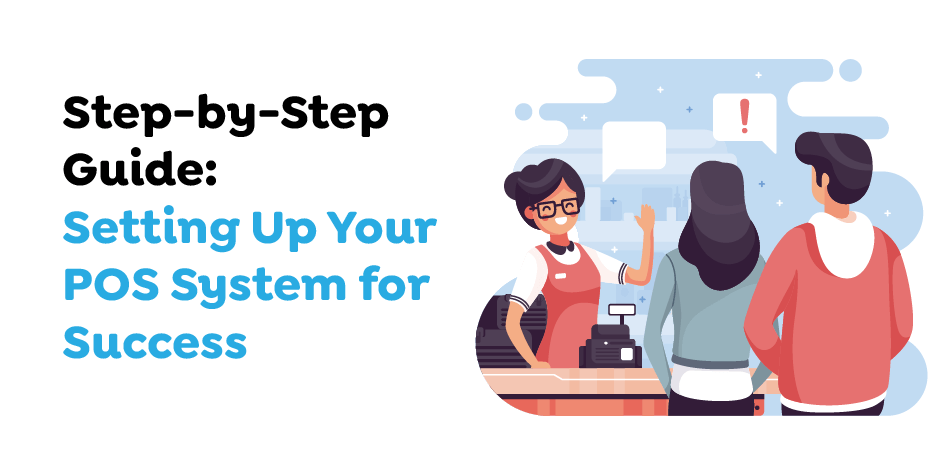
The point-of-sale (POS) system allows retailers to handle offline and online transactions. POS devices aid retailers in processing cash and card transactions in brick-and-mortar shops, while Online POS interfaces permit online stores to process transactions through an online checkout point.
Apart from handling payments, POS platforms that integrate with ERP systems can help you keep track of inventory, provide data, and help you better manage your customers. Also, the full-fledged POS is an effective retail management platform. Although every business requires a POS system, setting it up can challenge specific individuals.
Let’s consider ways to choose a POS system that is a good fit for you and then set it up to effortlessly handle all of your transactions.
Define Your Requirements
The first step in creating the POS system is defining your business’s requirements. Think about the type of company, the volume of transactions, and the features you require. Are you in the retail or hospitality sector? Knowing your needs will aid you in selecting the most appropriate POS system for your company.
Choose the Right POS System
With a thorough grasp of your needs and requirements, you can select the most suitable POS system. There are many options, from traditional on-premise solutions to cloud-based ones. Cloud-based POS systems are becoming popular because of their accessibility and flexibility. Find different options, review their services, read the reviews, and pick a solution that is compatible with your company’s objectives.
Hardware Selection
One of the most essential aspects of POS installation is selecting POS hardware. This usually includes the POS terminal and printer for receipts, a barcode scanner, and a cash drawer. Check compatibility between the selected POS hardware and software. Specific systems offer bundles that ease the process, supplying all the hardware needed in one bundle.
Installation of POS Software
After the hardware is installed, the next step is installing your POS software. If you’ve selected cloud-based systems, the process is typically easy. Follow the directions of your provider to install software, set up user accounts, and configure settings to suit your business needs. If you’ve selected an on-premise option, be sure you adhere to the installation steps carefully. Technical support will assist in setting up your POS software, either physically or via a virtual interface.
Set Up Products and Inventory
Once the POS software is in place, you should enter your items and create your inventory. This is essential for accurately monitoring sales and stock levels. Depending on the size of your product log, you may need to input product names, descriptions, prices, and stock quantities. Specific POS systems also allow the scanning of barcodes for effective inventory control.
Managing a huge inventory is difficult when your company has hundreds of items that require transfer to the Point of Sale (POS) system.
Set Up Payment Processing
One of the primary purposes of the POS system is the processing of payments. You can configure the POS system to accept many payment methods, such as debit cards, credit cards, and mobile payments. Ensure that the system is integrated seamlessly with your preferred payment processor to allow for smooth and secure payments. In order to provide top-quality customer service, it’s essential to make sure that the POS processing process is effortless and secure.
Train Your Staff
An effective POS system will only be effective if the staff are appropriately educated to use it. Give thorough training to your employees on basic transactions, product searches, returns, as well as any other functions that pertain to your company. A well-informed and competent staff can contribute to the overall performance of your POS system’s implementation. Many system providers offer employees hands-on training when installing their POS system.
Test the System
Before fully deploying the POS system to run daily operations, you must test the system thoroughly. Perform sample transactions, verify the accuracy of your inventory, and verify that the hardware components are operating correctly. Fix any issues during the testing process to avoid disruptions for your business after the system is operational.
Monitor and Update Regularly
After successfully setting up the POS system, tracking its performance is essential. Be aware of the amount of inventory and transaction data and any possible issues. Be aware of software updates and make them available quickly to ensure your POS system is safe and current.
Tips to Increase Sales Using Your System of POS System
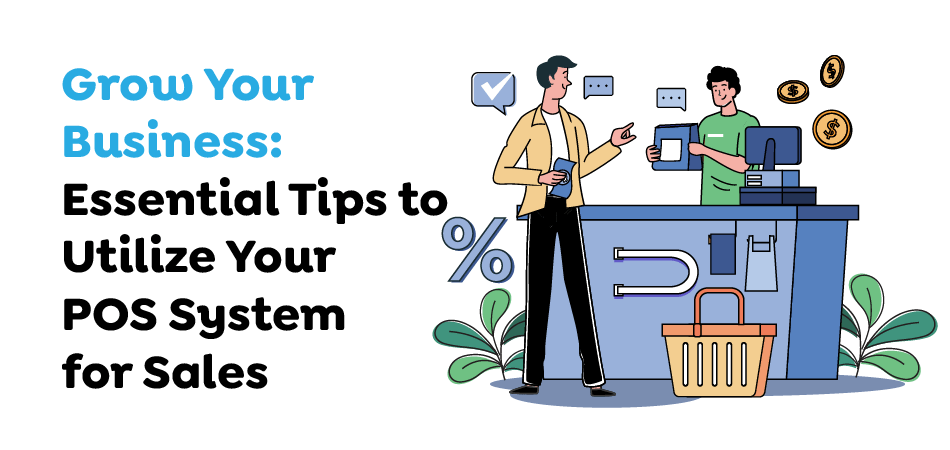
Given below are some tips to increase sales using your PoS System.
Customer Experience Enhancement
Your POS system could provide a better customer experience. To accelerate sales:
- Streamline checkout: Ensure that the checkout process is speedy and easy. A reliable, speedy POS system can reduce wait times and queues, directly impacting customer satisfaction.
- Personalized promotions: Utilize customer preferences and purchase history stored within your POS to design customized offers and promotions, increasing the probability of repeat customers.
- Programs for loyalty: Implement the loyalty program into the POS system. This will encourage customers to return through rewards that are based on the customer’s spending habits.
Data-driven Decision Making
Make use of the power of data analytics within the POS system to boost the growth of your business:
- Analyzing sales data regularly: Review sales reports to determine your top-selling items and peak times. Make use of this information to alter the amount of staff and inventory.
- Inventory optimization: Track inventory levels to ensure the top-selling items are always available while identifying and addressing slow-moving products.
- Targeted marketing: Use your customers’ data to analyze your market and develop powerful, specific marketing strategies that address your clients’ desires and needs.
- Informative recommendations: Use the POS system to inform employees about products or alternatives similar to those customers are already buying.
- Training: Regularly instruct your employees on the details of products and the advantages of adding premium features or items so that you can confidently convince customers to make additional purchases.
Mobile POS Utilization
Mobile POS systems can change the customer experience through the flexibility to improve service and enhance customer experience:
- Reducing wait times: The mobile POS staff can process transactions at any time within the store, cutting down on lines for traditional counters to pay.
- Staff members on the spot: Provide them with mobile devices to help customers shop on the sales floor, thereby giving customers a more personal shopping experience.
- Improved customer service: Customers can use mobile POS to search for information on a product, look up inventory, or even make a purchase by placing an order for an out-of-stock item for delivery at home.
Regular Software Updates and Staff Training
It is crucial to stay current on POS technology and ensure that your employees are knowledgeable about the system’s capabilities.
- Software update: Regularly scheduled updates provide new functions, enhanced security, and better connectivity with different systems. Make sure to keep your POS up-to-date to take advantage of these advancements.
- Continuous training: When new features are introduced, ensure your employees are equipped to fully utilize them. This will ensure that your staff maximizes your POS system’s potential to increase sales and deliver exceptional service.
Conclusion
In this complete guide to creating the custom POS system, we’ve reviewed the factors that ensure a smooth installation.
From choosing the best equipment and software to managing inventory, the focus is on maximizing efficiency and improving customer satisfaction.
By following this advice, business owners can create a robust POS system to streamline operations, maximize sales, and stay ahead in the retail industry’s ever-changing landscape.
Ready to transform your business with a custom POS system? Get in touch with Techugo today to streamline operations and boost your sales!
Get In touch
We are excited to here from you and let’s start something special Together. Call Us for any inquiry.
Write us
sales@techugo.caJust a call away
About you




